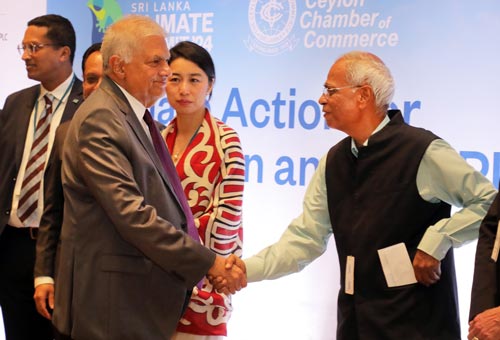Sri Lanka Climate Summit, Mobility Opportunities, & Policy Facilitation

President Ranil Wickremesinghe being welcomed at the summit (File pic).
The Sri Lanka Climate Summit closed on May 9 with the signing of a declaration that pledged to address the climate crisis with decisive, science-based actions. They emphasised urgency in adopting innovative solutions, strategic adaptation aligning with international frameworks, and leveraging local assets for ecological transformation. Key commitments include fostering public-private partnerships, promoting sustainable development, utilising innovative financing, and enhancing education and capacity building. The declaration invites global and local stakeholders to join in supporting climate-resilient and green growth initiatives in Sri Lanka.
Energy and mobility were two sessions that were discussed at length at the event. The need for Sri Lanka to address the present high energy cost through increased decarbonisation of the energy grid was widely accepted. The technical ability to decentralise and decarbonise the energy grid and thus reduce energy cost was also endorsed. It was recognised that this could reduce the cost of electricity to the consumer by as much as 30 per cent.
The concurrent conversation on mobility clearly showed that the cost of a battery electric vehicle (BEV) was now on par with an internal combustion engine (ICE) vehicle. The energy efficiency of a BEV is over 40 per cent greater than the ICE. The cost saving on energy over the life of a BEV is astounding. This difference is approximately 60 per cent including the cost of a battery change every seven years.
Prof. Ashok Jhunjhunwala in his presentation at the conference stressed that in his view the present expenditure of the import of fuel was negatively impacting Sri Lanka’s economic development. Further, he said Sri Lanka can explore supply chain participation in the listed areas of BEV manufacture in Sri Lanka.
Electricity and transport are facilitators in an economy. The effectiveness and competitiveness of these two sectors drive the overall competitiveness of an economy. Achieving a 30 per cent cost reduction in electricity costs and a similar reduction in the cost of transport can help increase the competitiveness of our exports, whilst also creating the ability to export mobility products which is a growth area in India and the region.
The key to enabling these developments rest with the Government taking policy decisions that support and facilitate the reduction in energy costs and the aggressive transition towards electric mobility. In the energy sector, the Energy Act provides such facilitation. Moving forward on the controversial Adani project could also signal that Sri Lanka is ‘open for business’ in the energy sector.
The policy signals in the mobility space are opaque. The policy that one would rationally expect the government to take is to permit only the import of electric vehicles (2 wheel, 3 wheel and 4 wheel). This policy signal will give impetus to the establishment of the charging network. Over 300 charging stations emerged in 2014/15 when a low rate of duty was levied on BEV’s. The government should also require BEV importers to be done only by agents of reputed vehicle manufacturers, and these agents required to prove that they have trained staff to support the vehicles they import and that they will accept the responsibility of recycling the batteries of the vehicles they import. This can be done by submitting formal agreements with battery recyclers and through a customs audit trail that ensures compliance.
With this policy support the mobility sector can support the sustainable development of the Sri Lankan economy and not merely be a sector that consumes billions of dollars annually in terms of CIF cost of vehicle imports and petroleum to support the running of these imports.
(The writer is an economist by training and was Co-Chair of the Steering Committee on Climate Action of the Ceylon Chamber of Commerce).
Hitad.lk has you covered with quality used or brand new cars for sale that are budget friendly yet reliable! Now is the time to sell your old ride for something more attractive to today's modern automotive market demands. Browse through our selection of affordable options now on Hitad.lk before deciding on what will work best for you!


